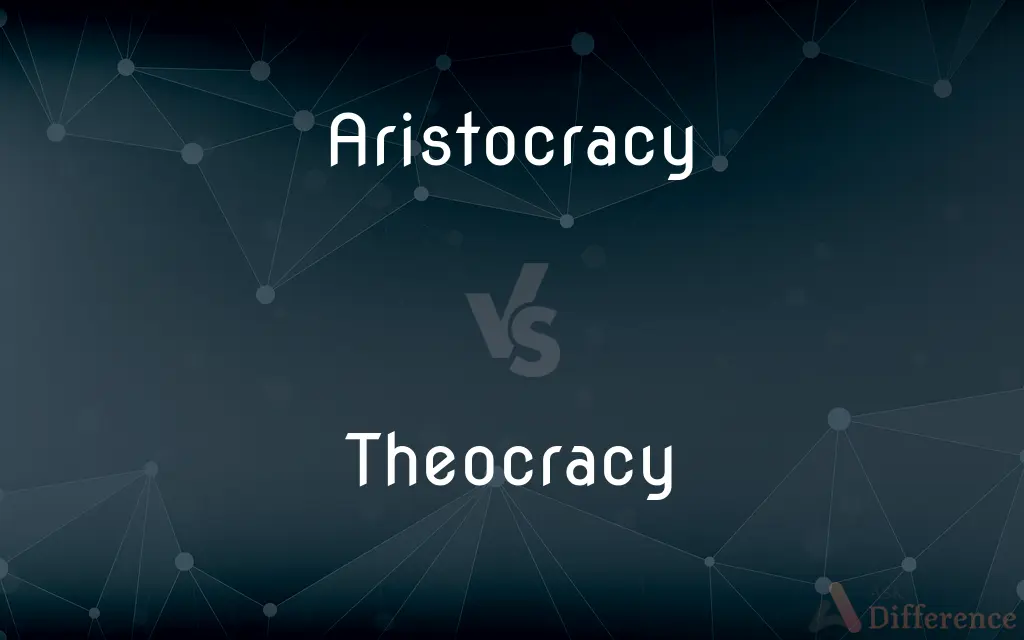Aristocracy vs. Theocracy — What's the Difference?

Difference Between Aristocracy and Theocracy
ADVERTISEMENT
Compare with Definitions
Aristocracy
Aristocracy (Greek: ἀριστοκρατία aristokratía, from ἄριστος aristos 'excellent', and κράτος, kratos 'rule') is a form of government that places strength in the hands of a small, privileged ruling class, the aristocrats. The term derives from the Greek aristokratia, meaning 'rule of the best'.At the time of the word's origins in ancient Greece, the Greeks conceived it as rule by the best-qualified citizens—and often contrasted it favorably with monarchy, rule by an individual.
Theocracy
Theocracy is a form of government in which a deity of some type is recognized as the supreme ruling authority, giving divine guidance to human intermediaries that manage the day-to-day affairs of the government.The Imperial cult of ancient Rome identified Roman emperors and some members of their families with the divinely sanctioned authority (auctoritas) of the Roman State. The official offer of cultus to a living emperor acknowledged his office and rule as divinely approved and constitutional: his Principate should therefore demonstrate pious respect for traditional Republican deities and mores.
Aristocracy
The highest class in certain societies, typically comprising people of noble birth holding hereditary titles and offices
Members of the aristocracy
Theocracy
Government ruled by or subject to religious authority.
Aristocracy
A hereditary ruling class; nobility.
ADVERTISEMENT
Theocracy
A country or state governed in this way.
Aristocracy
Government by a ruling class.
Theocracy
Government under the control of a state religion.
The Vatican City State is a Pope.
Aristocracy
A state or country having this form of government.
Theocracy
Rule by a god.
Aristocracy
Government by the citizens deemed to be best qualified to lead.
Theocracy
Government of a state by the immediate direction or administration of God; hence, the exercise of political authority by priests as representing the Deity.
Aristocracy
A state having such a government.
Theocracy
The state thus governed, as the Hebrew commonwealth before it became a kingdom.
Aristocracy
A group or class considered superior to others.
Theocracy
A political unit governed by a deity (or by officials thought to be divinely guided)
Aristocracy
The nobility, or the hereditary ruling class.
Theocracy
The belief in government by divine guidance
Aristocracy
Government by such a class, or a state with such a government
Aristocracy
A class of people considered (not normally universally) superior to others
Aristocracy
Government by the best citizens.
Aristocracy
A ruling body composed of the best citizens.
In the SenateRight not our quest in this, I will protest themTo all the world, no aristocracy.
Aristocracy
A form a government, in which the supreme power is vested in the principal persons of a state, or in a privileged order; an oligarchy.
The aristocracy of Venice hath admitted so many abuses, trough the degeneracy of the nobles, that the period of its duration seems approach.
Aristocracy
The nobles or chief persons in a state; a privileged class or patrician order; (in a popular use) those who are regarded as superior to the rest of the community, as in rank, fortune, or intellect.
Aristocracy
A privileged class holding hereditary titles
Aristocracy
The most powerful members of a society
Share Your Discovery

Previous Comparison
Hallway vs. Hall
Next Comparison
Interment vs. Burial













































